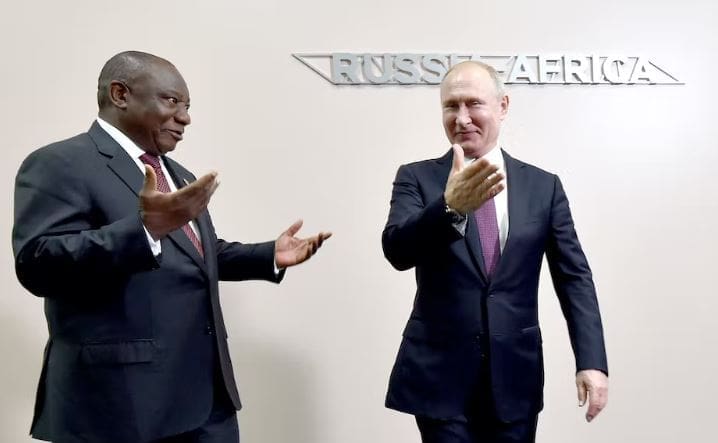President Cyril Ramaphosa says the African Peace Initiative to Ukraine and Russia was a ‘historic’ effort to bring a peaceful resolution to the conflict between the two countries.
The President was addressing the country through his weekly newsletter following his return from the European countries.
African Heads of State from Senegal, the Comoros, Zambia and South Africa, together with the Prime Minister of Egypt and envoys from the Republic of Congo and Uganda travelled to the two Eastern European countries to hold talks with Ukraine President Volodymyr Zelenskyy and Russian leader President Vladimir Putin over the weekend.
“This initiative has been historic in that it is the first time African leaders have embarked on a peace mission beyond the shores of the continent. Although the delegation comprised countries that have taken diverse positions on the various UN resolutions on the conflict, the countries represented have all taken a non-aligned stance on this issue. This has lent credibility to the mission and engendered trust from both sides.
“As South Africa we continue to maintain our position that this conflict should be settled through negotiation and by diplomatic means, in line with founding principles of the Non-Aligned Movement, and that it is in the collective interest of everyone that it come to an end soon,” he said.
President Ramaphosa said the African leaders set out a ten point plan that could “contribute to various efforts that have been made” to bring an end to the conflict.
“Included in the proposal being put forward as part of the African Peace Initiative are calls for a de-escalation of fighting and for negotiations to commence with urgency; for the release of prisoners of war and return of children; for greater humanitarian support; and for reconstruction efforts to be prioritised.
“We affirmed that the sovereignty of countries should be respected in line with the principles of the United Nations Charter. We highlighted the urgent need that the security of both nations should be guaranteed,” he said.
President Ramaphosa said the primary concern remains for people who have been directly affected by the conflict.
“We believe that everything should be done to end the fighting to prevent further loss of life, injury, displacement and destruction. As the international community we need to work together to prevent any further suffering.
“The toll on human life, the extensive destruction and the ripple effect it has had on the global economy mean that no country has been shielded. The conflict has caused instability, precipitated a humanitarian crisis and sent shockwaves through vulnerable economies,” he said.
Africa’s interest
President Ramaphosa said the continued conflict also has a “very real effect on African countries and economies”.
He explained that Africa’s material interest in the conflict pertains to the fact that the two countries are major grain suppliers to the African continent and the conflict has triggered shortages of grain on the continent of up to 30 million tonnes.
“There is a misconception that this conflict is far-removed from the realities of our own country. We made the point to the Ukrainian and Russian Presidents that while we undertook this mission as members of the international community committed to peacebuilding, we as the African continent also have a material interest in seeing a resolution to the conflict,” he said.
“As a result of this conflict African countries are negatively affected by the rising costs of food and energy. Supply chain disruptions have caused a shortage of farming inputs such as fertilisers threatening the food security of a number of African countries,” President Ramaphosa said.
He said African leaders also put forward a proposal for the “opening up of the movement of grains across the Black Sea for grains” from either one of the countries with further engagements expected to take place.
“As engagements with both parties and African leaders continue, it is our hope that as the process moves forward, a foundation can be set for a de-escalation of the conflict and negotiation, the two crucial preconditions for a lasting peace,” President Ramaphosa concluded. – SAnews.gov.za
